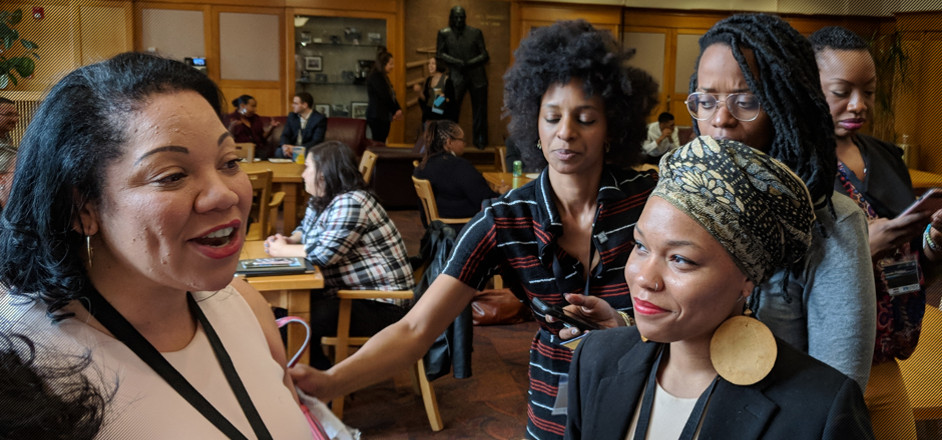Why should minorities be welcomed and encouraged into the booming cannabis industry, which only has a tiny fraction of black owners in it now?
First, lots of PC, social justice reasons: systemic racism, white privilege, reparations. …
All true. But if you want a reason that will stir your soul, listen to someone who's already there.
"We throw parties. Ragers. Bangers," says Ru Johnson of Roux Black, a party planning company. She was one of the speakers at the first ever Opportunity Summit from the Minority Cannabis Business Association in Denver. "That's why we're good for cannabis."
Between 25 and 40 percent of Americans are minorities, depending on your definition. But in pot? "We have one percent of cannabis businesses owned by people of color," says Kayvan Khalatbari, an organizer of the summit and a cannabis business owner of Iranian descent. "That has to change."
There are voices speaking loudly on this topic nationwide, including celebrities: Whoopi Goldberg and Jay-Z talk about it. The keynote speaker of the Opportunity Summit was Hall of Fame Bronco Terrell Davis.
Groups like the California Minority Alliance and Latinos for Cannabis are on the case.
And it's causing a noticeable difference in the cannabis world. In Denver, at last month's Women Grow summit and at this week's Minority Cannabis Business Association's Opportunity Summit — both run by minorities — most rooms were majority minority. And there was an energy, an excitement not found at whiter conferences.
Take Joe and Jamalle Reeves, father and son. Joe is the father, a financial advisor. Jamalle, the son, has owned his own business. They've already invested more than $100,000 in the cannabis industry. But when they go to the big banks to seek financing to expand their cannabis investments, they feel the banks stereotype them as much as the rest of the country does. "They won't give people of color money; they run the other way," Joe says.
Shaka Singleton of Atlanta feels the same; he thinks banks let emails from him — a guy named "Shaka" — sink to the bottom of the inbox. "Then they find out I'm a Duke MBA, and then it all flips," Singleton says.
This isn't a white specific problem, either. The attendees say there is also prejudice within the black community. Black churches are generally anti-drug; and a lot of older black folks think weed smokers are lazy. And so black folks shy away from coming out of the weed closet in their own communities.
The invisible barriers to entry for minorities keep the inequality of the drug war rolling. One conference attendee, a black man, say he still sells weed on the gray market. And he told Rooster that his inability to get funding for a legit business has kept him working there.

Echoing those stories and many others, the lunch room crackled with energy. The conference was loud. All good reminders of the fact the push to include more people of color in cannabis isn't just a charity pitch, not just — "bring in minorities to right a wrong and get a good liberal warm fuzzy feeling in your Irish-Italian avocado-toast and ashtanga-loving heart." Speakers talked about how the African/American/Caribbean culture, from Ubuntu all the way through Southern Blues and the Harlem Renaissance, can liven up the pot world.
Even indirectly. Alicia Payne runs Highend Transportation, one of Denver's many companies that will let you smoke weed while they drive you around town. These vehicles tend to be vanilla in the industry — short buses with a Pink Floyd poster on the ceiling. But not Highend's, owned by black, queer purple-hair'd people. It offers something steezier: Teslas and Mercedezes and Beamers. "We have this twist, this twang," Payne says. "This style."
Are any of these efforts to include more black folks having an effect? Yes. Many at these summits say that cannabis is more welcoming than, say, investment banking. And while only 1 percent of weed businesses are controlled by people of color, that number is changing rapidly, especially now that places like California and Georgia are starting to legalize. As high as 19 percent of weed enterprises are at least partly owned by minorities. (Meaning, the business has a minority owner who is a minority — but that doesn't make the business minority-owned. Make sense?)
So there is hope. A feeling that things are looking up. "We're not just meant to sell weed in dime bags anymore," says Jake Plowden of the Cannabis Cultural Association. "We're meant to go beyond the block into the boardroom."



Leave a Reply
You must be logged in to post a comment.